 Cover of original hardcover | |
| Author | Hal Bennett |
|---|---|
| Country | United States |
| Language | English |
Wait Until The Evening is a novel by Hal Bennett published in 1974. [1] It was the follow-up to his award-winning novel Lord of Dark Places .
 Cover of original hardcover | |
| Author | Hal Bennett |
|---|---|
| Country | United States |
| Language | English |
Wait Until The Evening is a novel by Hal Bennett published in 1974. [1] It was the follow-up to his award-winning novel Lord of Dark Places .
HAL 9000 is a fictional artificial intelligence character and the main antagonist in Arthur C. Clarke's Space Odyssey series. First appearing in the 1968 film 2001: A Space Odyssey, HAL is a sentient artificial general intelligence computer that controls the systems of the Discovery One spacecraft and interacts with the ship's astronaut crew. While part of HAL's hardware is shown toward the end of the film, he is mostly depicted as a camera lens containing a red and yellow dot, with such units located throughout the ship. HAL 9000 is voiced by Douglas Rain in the two feature film adaptations of the Space Odyssey series. HAL speaks in a soft, calm voice and a conversational manner, in contrast to the crewmen, David Bowman and Frank Poole.
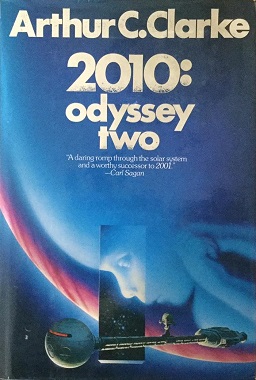
2010: Odyssey Two is a 1982 science fiction novel by British writer Arthur C. Clarke. It is the sequel to his 1968 novel 2001: A Space Odyssey, though Clarke changed some elements of the story to align with the film version of 2001.

Enoch Arnold Bennett was an English author, best known as a novelist who wrote prolifically. Between the 1890s and the 1930s he completed 34 novels, seven volumes of short stories, 13 plays, and a daily journal totalling more than a million words. He wrote articles and stories for more than 100 newspapers and periodicals, worked in and briefly ran the Ministry of Information in the First World War, and wrote for the cinema in the 1920s. Sales of his books were substantial and he was the most financially successful British author of his day.
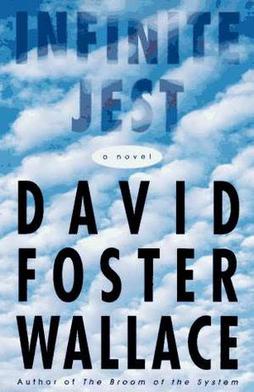
Infinite Jest is a 1996 novel by American writer David Foster Wallace. Categorized as an encyclopedic novel, Infinite Jest is featured in Time magazine's list of the 100 best English-language novels published between 1923 and 2005.

Topper is a 1937 American supernatural comedy film directed by Norman Z. McLeod, starring Constance Bennett and Cary Grant and featuring Roland Young. It tells the story of a stuffy, stuck-in-his-ways man who is haunted by the ghosts of a fun-loving married couple.

Merrily We Live is a 1938 American comedy film directed by Norman Z. McLeod and written by Eddie Moran and Jack Jevne. It stars Constance Bennett and Brian Aherne and features Ann Dvorak, Bonita Granville, Billie Burke, Tom Brown, Alan Mowbray, Clarence Kolb, and Patsy Kelly. The film was produced by Hal Roach for Hal Roach Studios, and was distributed by Metro-Goldwyn-Mayer.
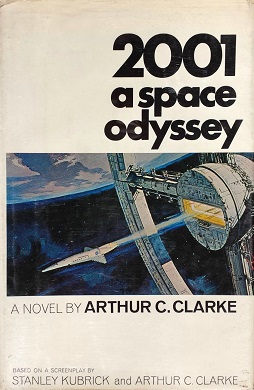
2001: A Space Odyssey is a 1968 science fiction novel by British writer Arthur C. Clarke. It was developed concurrently with Stanley Kubrick's film version and published after the release of the film. Clarke and Kubrick worked on the book together, but eventually only Clarke ended up as the official author. The story is based in part on various short stories by Clarke, including "The Sentinel". By 1992, the novel had sold three million copies worldwide. An elaboration of Clarke and Kubrick's collaborative work on this project was made in the 1972 book The Lost Worlds of 2001.

Gray Lady Down is a 1978 American submarine disaster film directed by David Greene and starring Charlton Heston, David Carradine, Stacy Keach, Ned Beatty, Ronny Cox and Rosemary Forsyth, and includes the feature film debut of Michael O'Keefe and Christopher Reeve. It is based on David Lavallee's 1971 novel Event 1000.
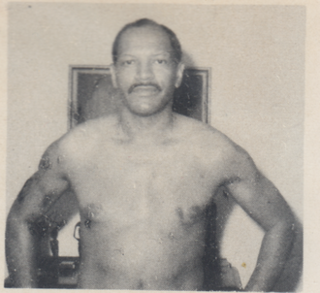
George Harold "Hal" Bennett was an author known for a variety of books. His 1970 novel Lord of Dark Places was described as "a satirical and all but scatological attack on the phallic myth", and was reprinted in 1997. He was Playboy's most promising writer of the year. He also wrote under the pen names Harriet Janeway and John D. Revere. His books are sometimes compared to Mark Twain's style of satire, but contain a much stronger sexual tone.

Navy Wife is a 1956 American comedy film directed by Edward Bernds, and starring Joan Bennett, Gary Merrill, Shirley Yamaguchi. The screenplay was written by Kay Lenard, based on the novel Mother Sir by Tats Blain. The film was produced by Walter Wanger, who was Bennett's husband in real life.
The Housekeeper's Daughter is a 1939 comedy/drama film directed and produced by Hal Roach. The film stars Joan Bennett, Adolphe Menjou and John Hubbard. The screenplay was written by Rian James, Gordon Douglas, Jack Jevne and Claude Martin, based on a novel by Donald Henderson Clarke.
The Three Musketeers is an American Saturday morning cartoon produced by Hanna-Barbera Productions for NBC. It premiered in 1968, running for 18 episodes as a segment on The Banana Splits Adventure Hour. The cartoon is based on the famous 1844 novel The Three Musketeers by Alexandre Dumas.
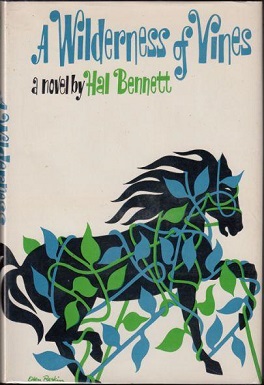
A Wilderness of Vines is a 1966 novel by Hal Bennett about post-slavery life in the South.
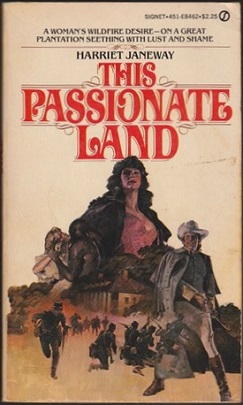
This Passionate Land is a 1979 romantic novel written by Hal Bennett, under the pen name of Harriet Janeway.

Mary Wollstonecraft Shelley was an English novelist who is best known for writing the Gothic novel Frankenstein; or, The Modern Prometheus (1818), which is considered an early example of science fiction. She also edited and promoted the works of her husband, the Romantic poet and philosopher Percy Bysshe Shelley. Her father was the political philosopher William Godwin and her mother was the philosopher and women's rights advocate Mary Wollstonecraft.

Flying Fists is a 1937 American film directed by Robert F. Hill.

The Lion Wakes is the first novel of the Kingdom series by Scottish writer of historical fiction, Robert Low, released on 14 April 2011 through Harper. The novel was well received.

Marriage is a lost 1927 American silent drama film directed by Roy William Neill and written by Gertrude Orr and Elizabeth Pickett Chevalier. It is based on the 1912 novel Marriage by H. G. Wells. The film stars Virginia Valli, Allan Durant, Gladys McConnell, Lawford Davidson, Donald Stuart, and Frank Dunn. The film was released on February 13, 1927, by Fox Film Corporation.

Thunder Over the Prairie is a 1941 American western film directed by Lambert Hillyer and written by Betty Burbridge. It is based on the 1935 novel The Medico Rides by James L. Rubel. The film stars Charles Starrett, Cliff Edwards, Eileen O'Hearn, Stanley Brown, Danny Mummert and David Sharpe. The film was released on July 30, 1941, by Columbia Pictures.

Cole Younger, Gunfighter is a 1958 American CinemaScope Western film directed by R. G. Springsteen and written by Daniel Mainwaring. It is based on the 1950 novel The Desperado by Clifton Adams. The film stars Frank Lovejoy, James Best, Abby Dalton, Jan Merlin, Douglas Spencer and Ainslie Pryor. The film was released on March 30, 1958, by Allied Artists Pictures.